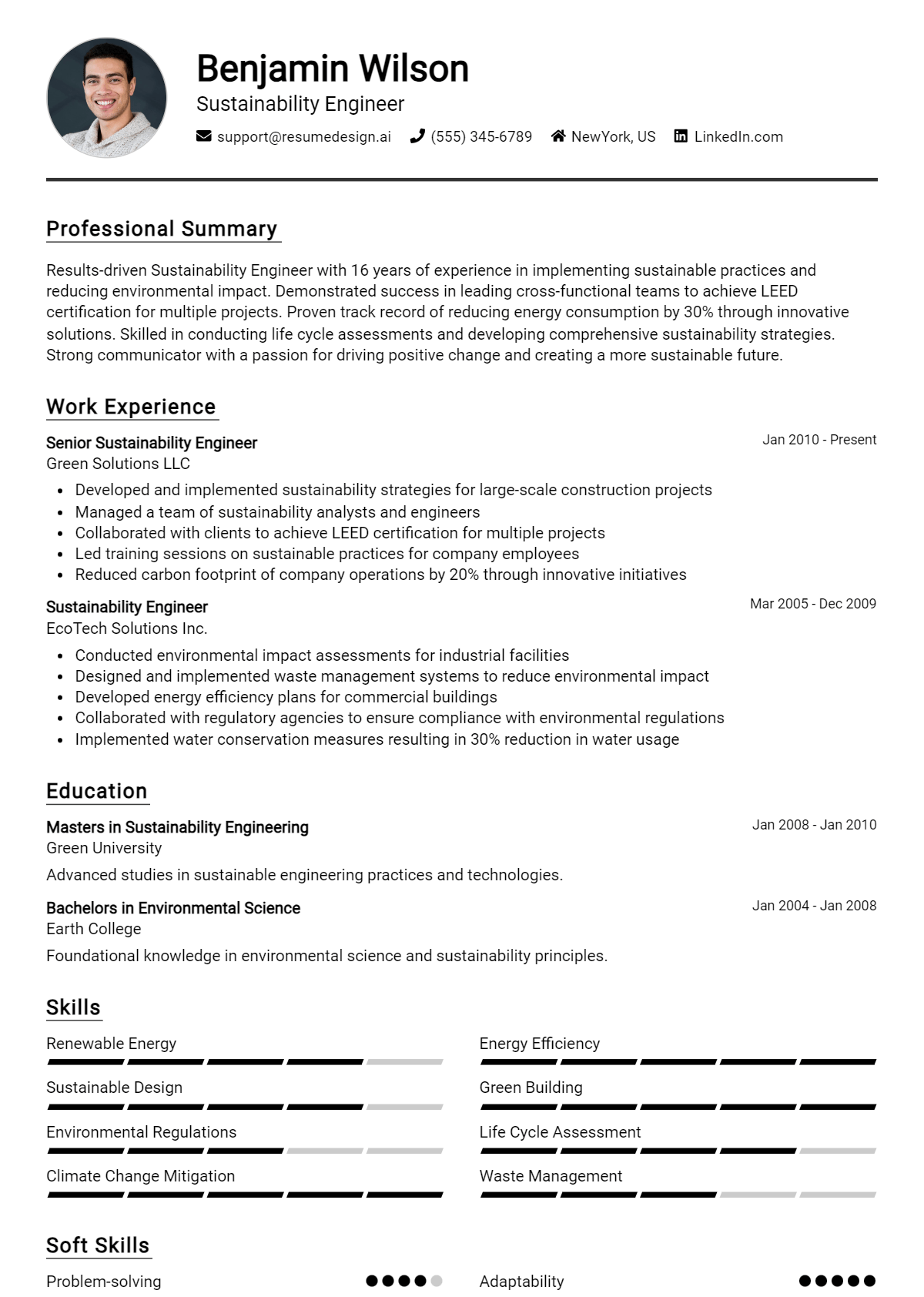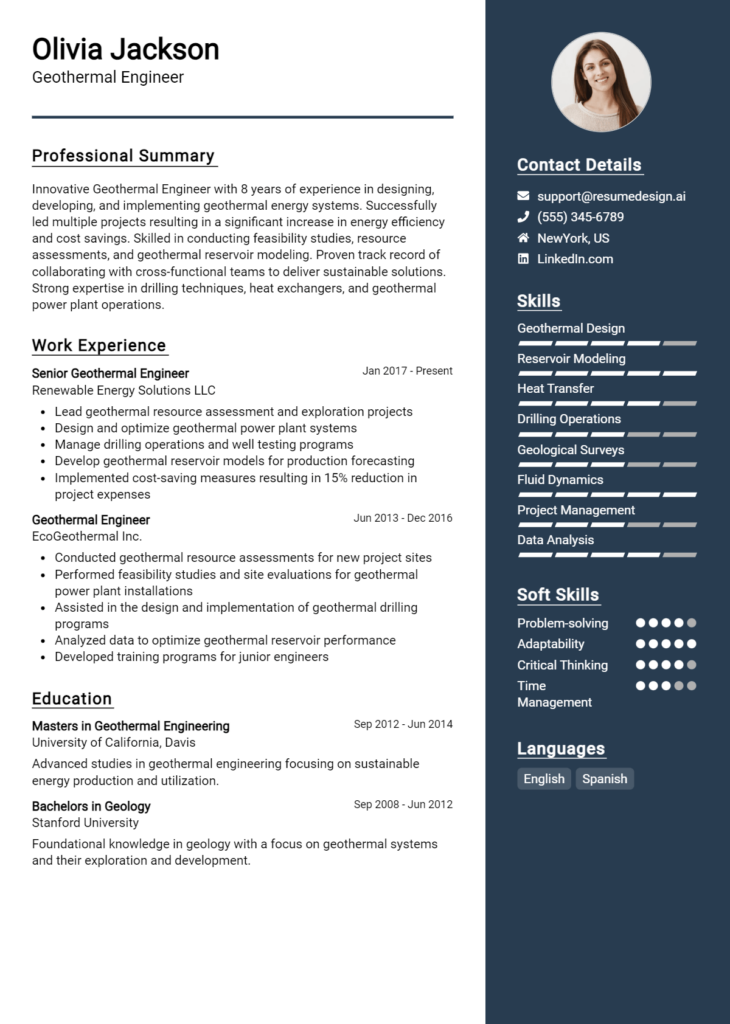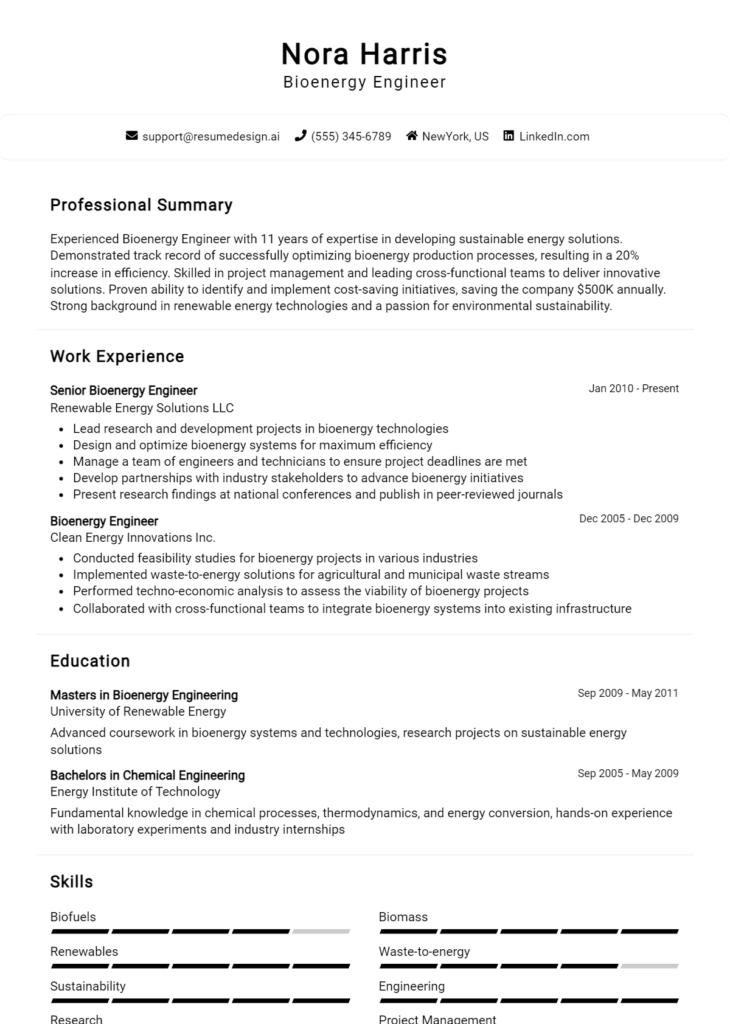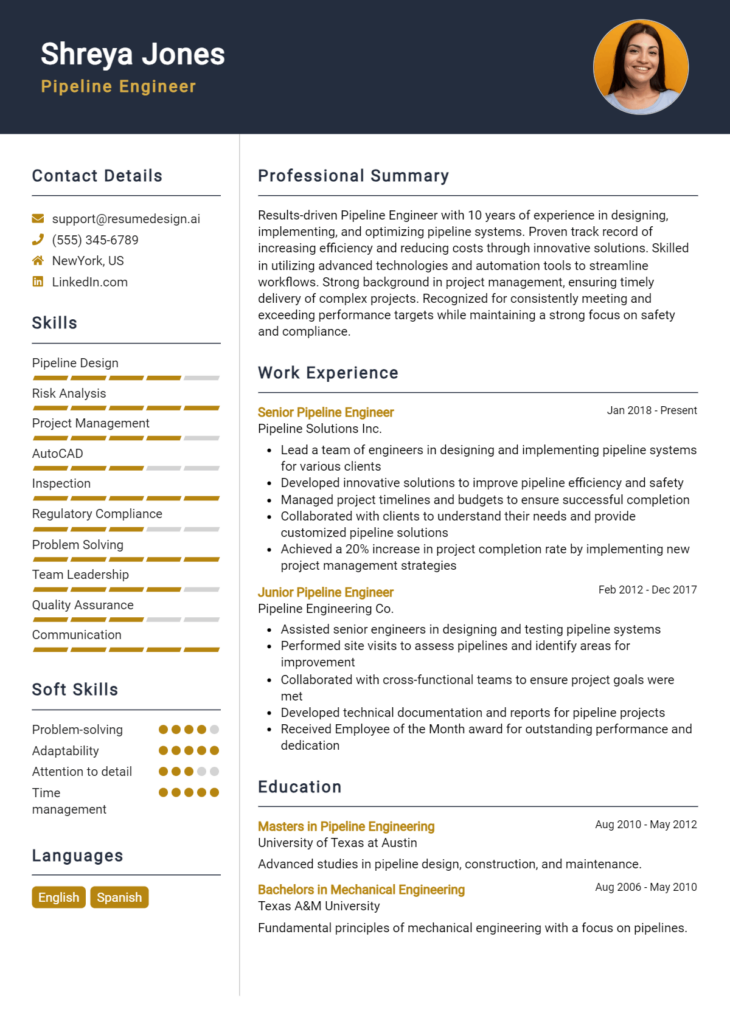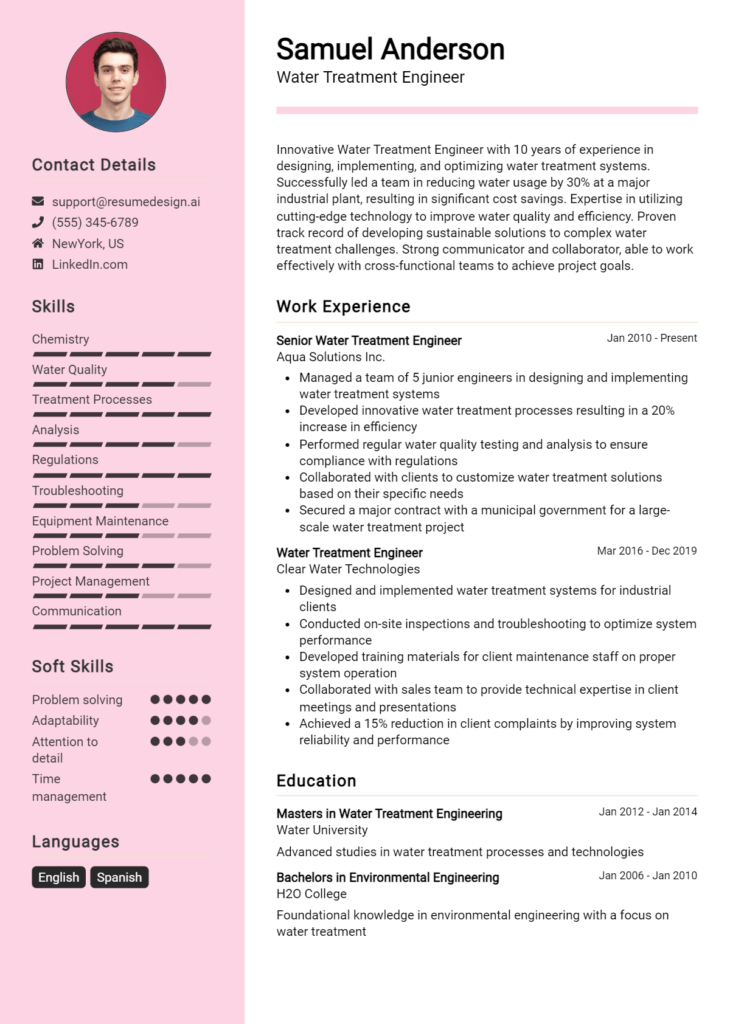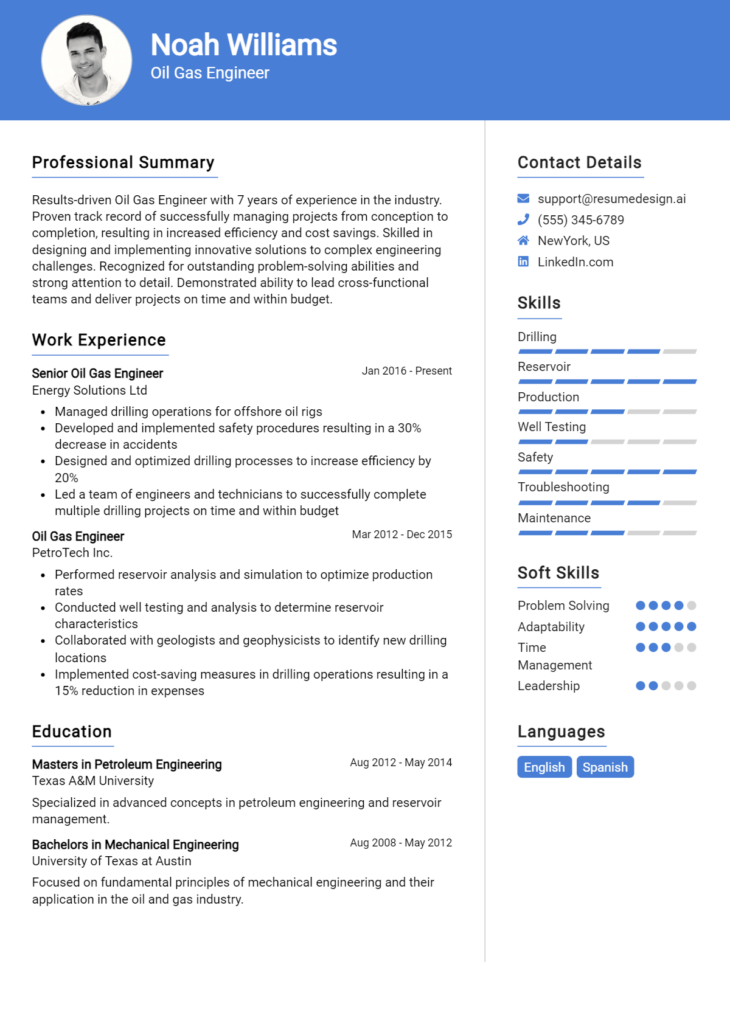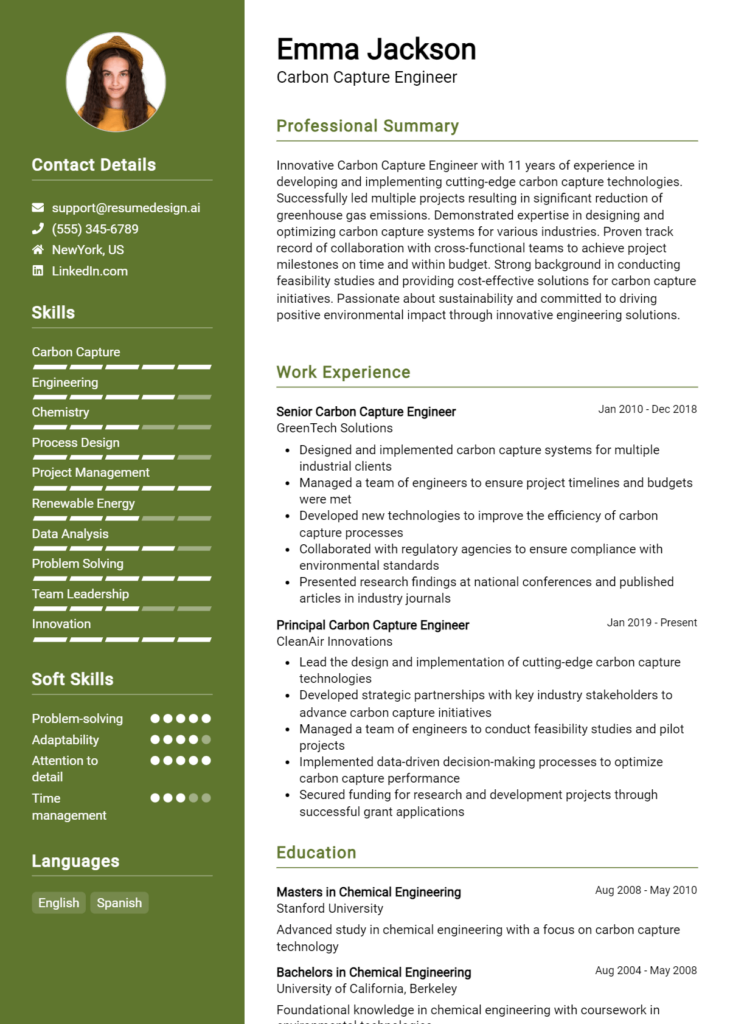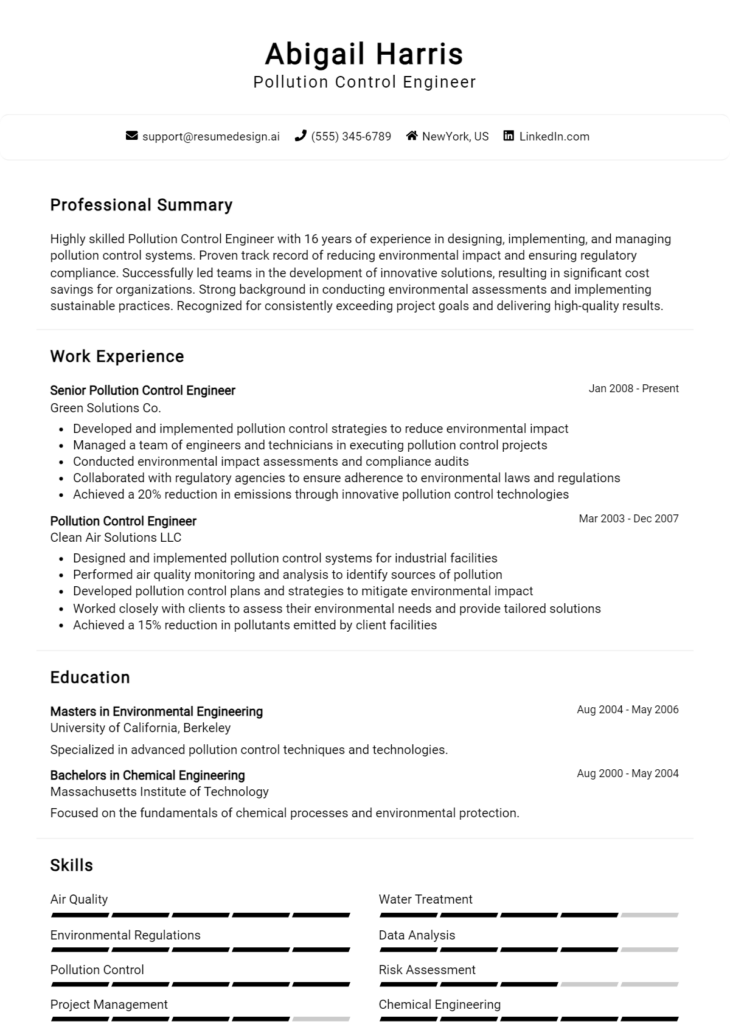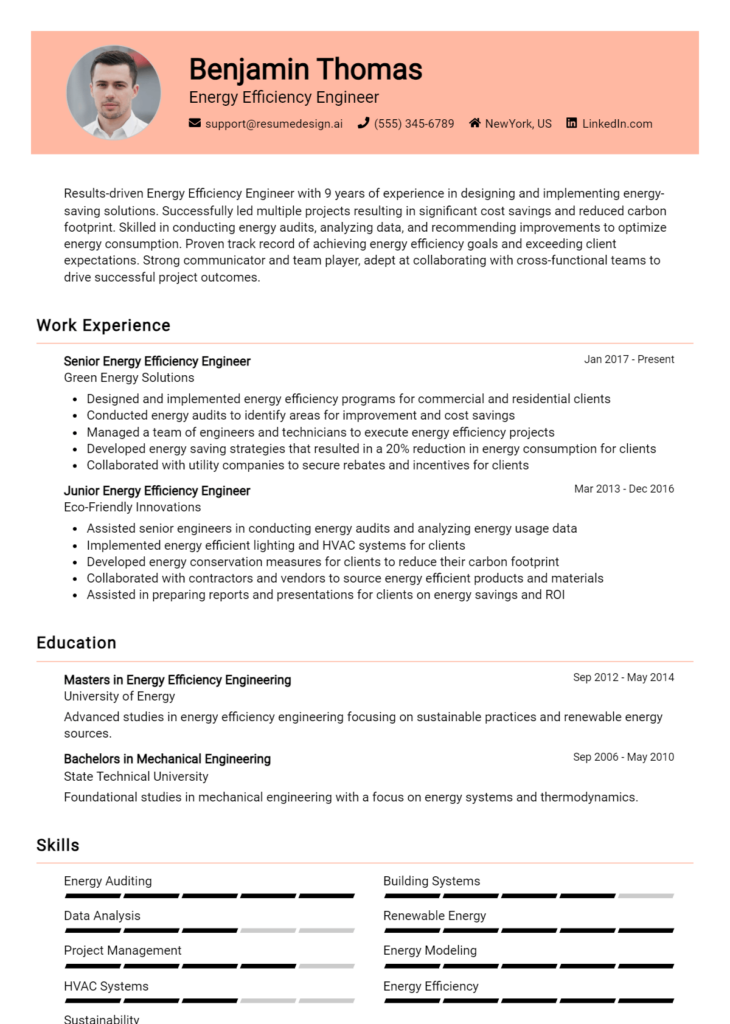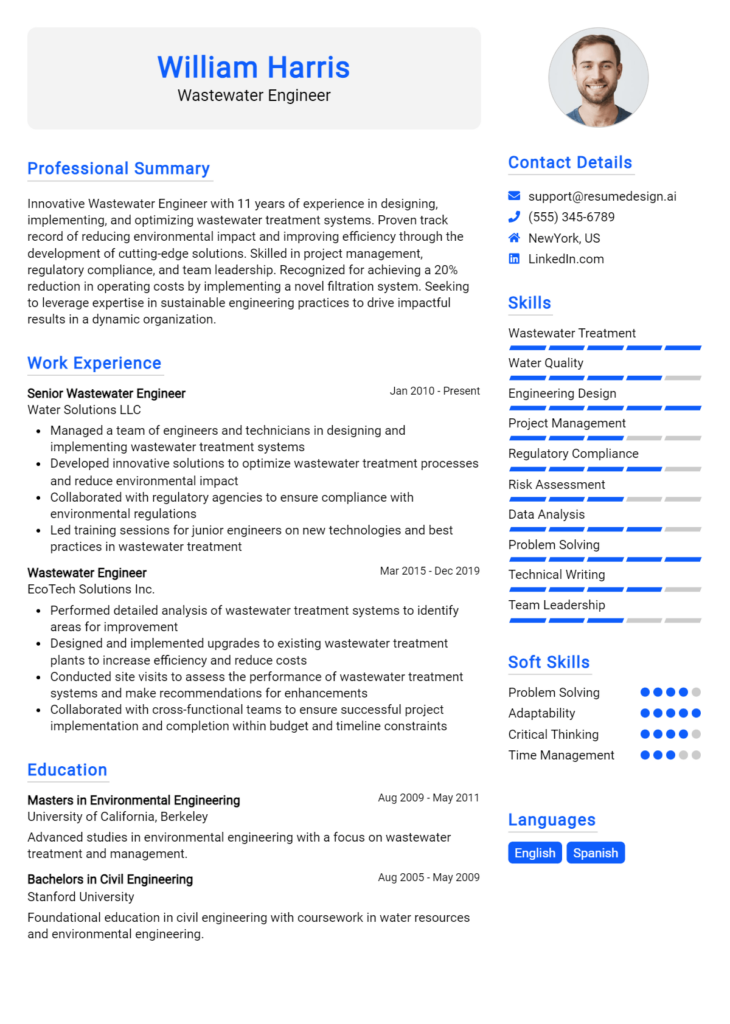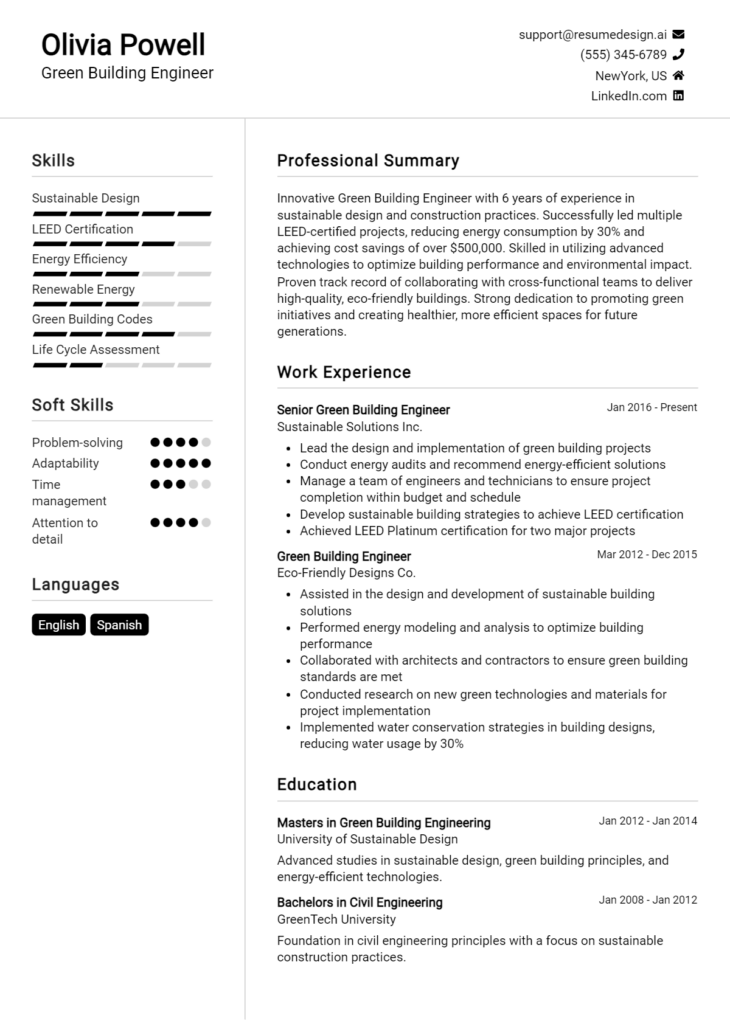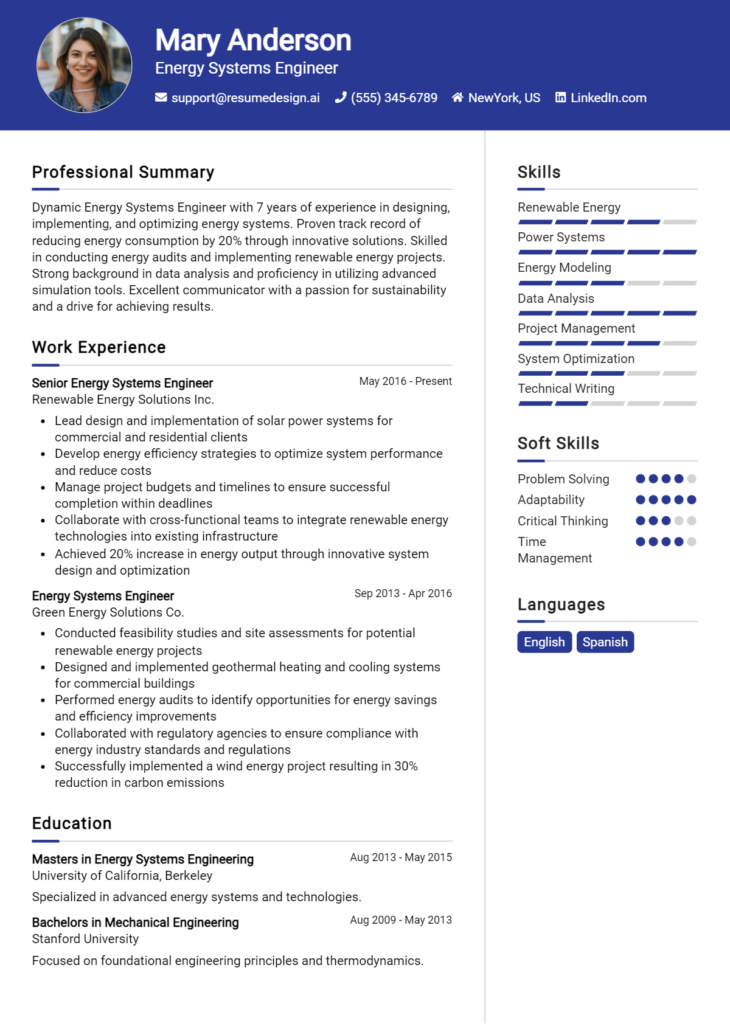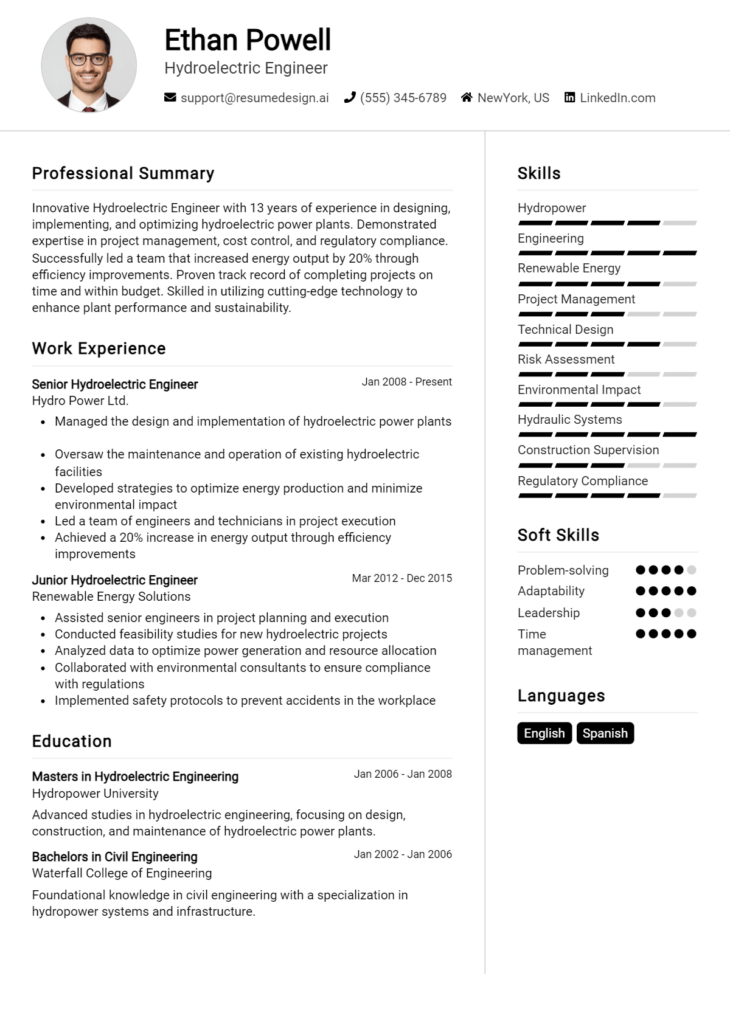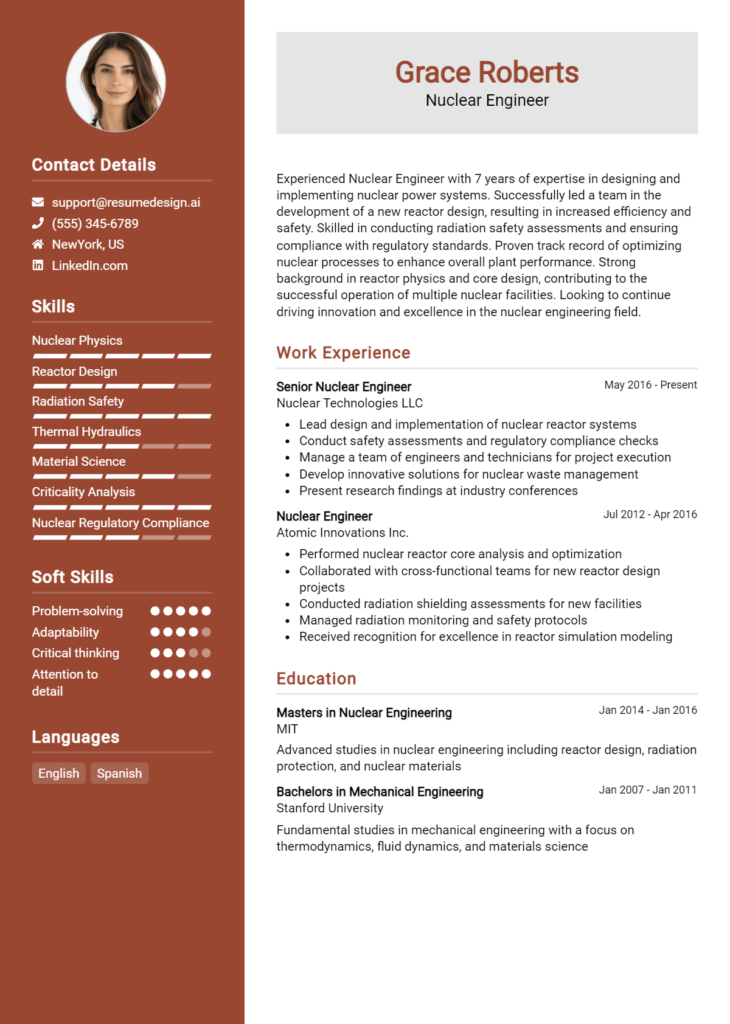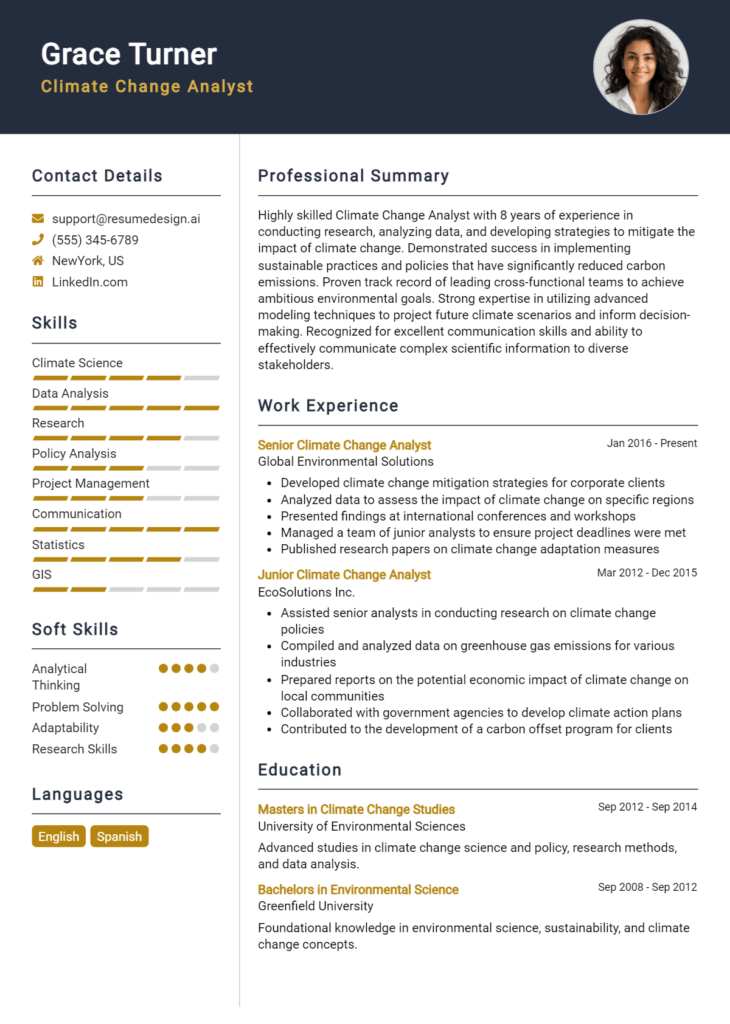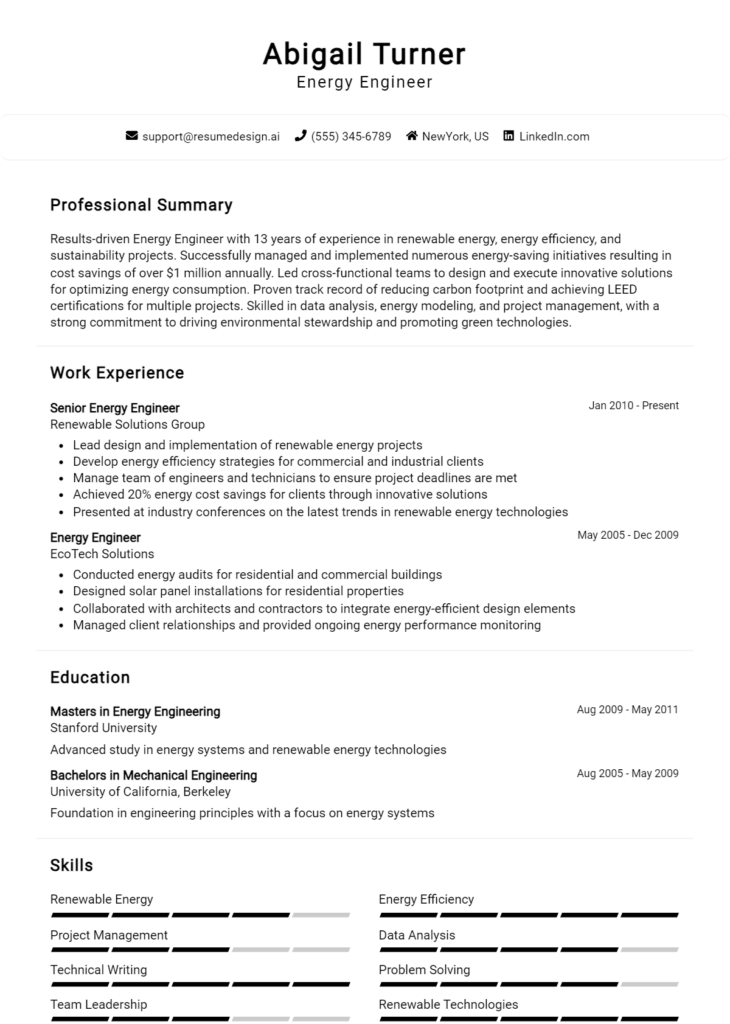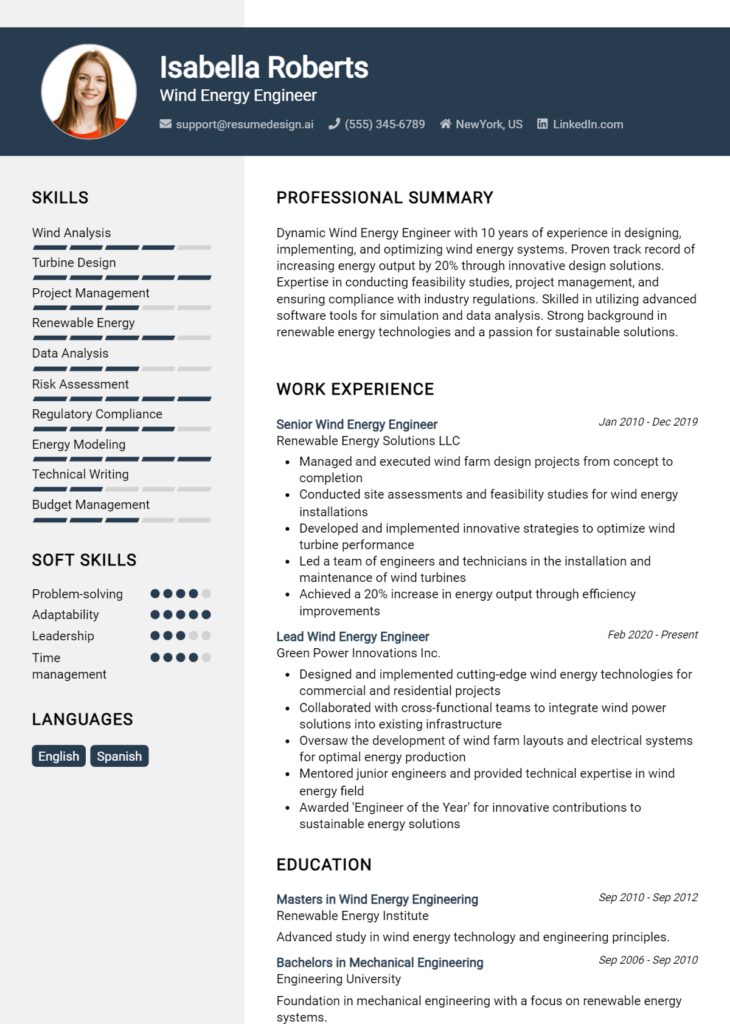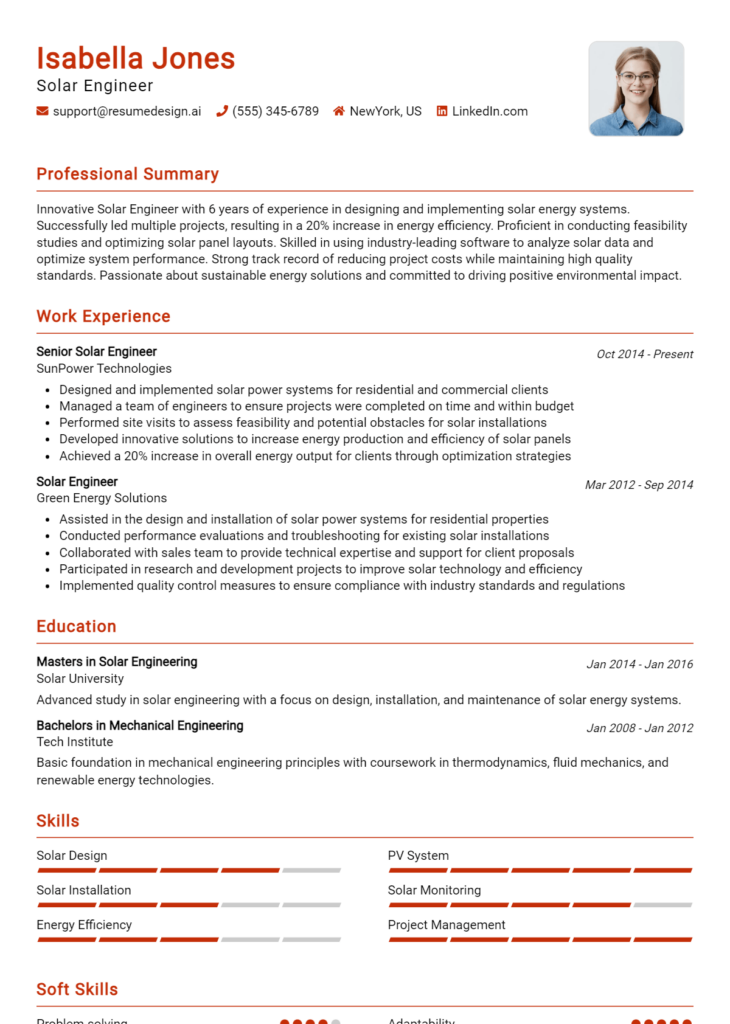Sustainability Engineer Core Responsibilities
A Sustainability Engineer plays a critical role in promoting eco-friendly practices within an organization. Their core responsibilities include assessing environmental impact, developing sustainable designs, and collaborating with various departments such as operations, engineering, and management. Essential skills encompass technical expertise in environmental science, operational efficiency, and strong problem-solving capabilities. By effectively bridging these functions, Sustainability Engineers contribute to the organization's sustainability goals, ensuring compliance with regulations and enhancing corporate responsibility. A well-structured resume showcasing these qualifications can significantly enhance career prospects.
Common Responsibilities Listed on Sustainability Engineer Resume
- Conduct environmental impact assessments and audits.
- Design and implement sustainable engineering solutions.
- Collaborate with cross-functional teams on sustainability projects.
- Monitor and report on sustainability performance metrics.
- Develop and maintain sustainability policies and procedures.
- Research and recommend sustainable materials and technologies.
- Ensure compliance with environmental regulations and standards.
- Lead training sessions on sustainability practices for staff.
- Engage with stakeholders to promote sustainability initiatives.
- Analyze data to identify areas for improvement in sustainability efforts.
- Prepare reports and presentations on sustainability progress.
- Stay updated on industry trends and advancements in sustainability.
High-Level Resume Tips for Sustainability Engineer Professionals
In today's competitive job market, a well-crafted resume is paramount for Sustainability Engineer professionals looking to make a lasting first impression on potential employers. Your resume serves as the initial gateway into your qualifications, showcasing not only your skills but also your achievements in the field of sustainability. A strong resume can set you apart from other candidates and highlight your commitment to environmental stewardship and innovative engineering solutions. This guide will provide practical and actionable resume tips specifically tailored for Sustainability Engineer professionals, ensuring that your application effectively communicates your value to prospective employers.
Top Resume Tips for Sustainability Engineer Professionals
- Tailor your resume to each job description by incorporating relevant keywords and phrases that align with the specific requirements of the position.
- Highlight your relevant experience, focusing on projects that demonstrate your ability to implement sustainable practices and technologies.
- Quantify your achievements by including metrics, such as energy savings, waste reduction percentages, or cost savings realized through your initiatives.
- Showcase your industry-specific skills, such as knowledge of environmental regulations, renewable energy technologies, and sustainable design principles.
- Include certifications or training related to sustainability, such as LEED accreditation, ISO 14001, or other relevant courses.
- Use action verbs to start your bullet points, emphasizing your proactive contributions and problem-solving abilities.
- Maintain a clean and professional format, utilizing headings, bullet points, and white space to enhance readability.
- Incorporate a summary statement at the top of your resume that encapsulates your career goals and key qualifications in sustainability engineering.
- Consider adding a section for professional affiliations or memberships in sustainability-focused organizations, showcasing your commitment to ongoing professional development.
- Keep your resume concise, ideally one page, while ensuring it includes all relevant information without overwhelming the reader.
By implementing these tips, you can significantly increase your chances of landing a job in the Sustainability Engineer field. A tailored, well-organized resume that effectively showcases your skills and accomplishments will not only capture the attention of hiring managers but also demonstrate your dedication to advancing sustainable engineering practices. Stand out as a candidate who is ready to make a positive impact in the industry!
Why Resume Headlines & Titles are Important for Sustainability Engineer
In the competitive field of sustainability engineering, a well-crafted resume headline or title can be a game-changer for job seekers. These succinct phrases serve as the first impression for hiring managers and can effectively capture their attention. A strong headline not only encapsulates a candidate's key qualifications but also communicates relevance to the specific role being applied for. By summarizing essential skills and experiences in an impactful way, a compelling headline can differentiate a candidate from the multitude of applicants, making it crucial for success in the hiring process.
Best Practices for Crafting Resume Headlines for Sustainability Engineer
- Keep it concise: Aim for a headline that is brief yet informative, ideally no more than 10-12 words.
- Be specific: Tailor the headline to reflect the specific role and responsibilities of a sustainability engineer.
- Highlight key skills: Include relevant technical skills or certifications that will grab the attention of hiring managers.
- Use action-oriented language: Choose dynamic verbs that convey your impact and contributions in previous roles.
- Include measurable achievements: If possible, incorporate numbers or percentages that showcase your successes.
- Align with job description: Use keywords from the job posting to ensure your headline resonates with the employer’s needs.
- Avoid clichés: Steer clear of overused phrases that can dilute the uniqueness of your application.
- Showcase your passion: Reflect your commitment to sustainability and environmental stewardship in your headline.
Example Resume Headlines for Sustainability Engineer
Strong Resume Headlines
Innovative Sustainability Engineer with 5+ Years of Experience in Renewable Energy Solutions
Certified Environmental Engineer Specializing in Sustainable Waste Management Practices
Results-Driven Sustainability Specialist Focused on Carbon Footprint Reduction
Dynamic Engineer Committed to Advancing Green Building Technologies
Weak Resume Headlines
Engineer Looking for Job
Professional with Experience in Various Fields
The strong headlines are effective because they provide specific information that highlights relevant skills and experiences, demonstrating the candidate's value to potential employers. They utilize action-oriented language and include industry-specific terminology, making them stand out. Conversely, the weak headlines fail to impress as they are generic and lack detail, making it difficult for hiring managers to gauge the candidate's qualifications or relevance to the sustainability engineering role.
Writing an Exceptional Sustainability Engineer Resume Summary
A well-crafted resume summary is crucial for a Sustainability Engineer, as it serves as the first impression for potential employers. This concise paragraph quickly captures the attention of hiring managers by highlighting key skills, relevant experience, and notable accomplishments that align with the job role. A strong summary not only showcases a candidate's qualifications but also emphasizes their passion for sustainability and commitment to environmental stewardship. To be effective, it should be impactful, succinct, and tailored specifically to the job the applicant is pursuing.
Best Practices for Writing a Sustainability Engineer Resume Summary
- Quantify Achievements: Use specific numbers and metrics to demonstrate your impact in previous roles.
- Focus on Relevant Skills: Highlight skills that are directly applicable to the position, such as energy efficiency, waste management, or sustainable design.
- Tailor the Summary: Customize your summary for each job application to reflect the requirements and responsibilities listed in the job description.
- Showcase Certifications: Include any relevant certifications or training to enhance your credibility in sustainability practices.
- Use Action-Oriented Language: Start sentences with strong action verbs to convey initiative and leadership.
- Keep it Concise: Aim for 3-4 sentences that deliver the most impactful information without unnecessary details.
- Highlight Collaborative Experience: Emphasize teamwork and collaboration in sustainability projects to showcase your ability to work with diverse groups.
- Demonstrate Passion: Convey a genuine interest in sustainability and environmental issues to connect with potential employers.
Example Sustainability Engineer Resume Summaries
Strong Resume Summaries
Detail-oriented Sustainability Engineer with over 5 years of experience in energy efficiency projects, achieving a 30% reduction in energy consumption for commercial buildings. Expert in LEED certification processes and sustainable design principles, driving successful project completions on time and under budget.
Results-driven professional with a Master's in Environmental Engineering and a proven track record of improving waste management systems, leading to a 25% decrease in landfill contributions for major corporations. Skilled in lifecycle assessment and green building practices.
Innovative Sustainability Engineer with expertise in renewable energy solutions, successfully implementing solar panel systems that generated 1.2 MW of energy for local communities. Committed to advancing sustainable practices in engineering through collaboration and strategic planning.
Weak Resume Summaries
Experienced engineer looking for a job in sustainability. I have done some projects in this area.
I am a motivated individual interested in environmental issues and engineering. I hope to find a position that aligns with my skills.
The examples provided demonstrate a clear distinction between strong and weak resume summaries. Strong summaries effectively quantify achievements, showcase relevant skills, and connect directly to the role of a Sustainability Engineer, thereby making a compelling case for the candidate. In contrast, weak summaries are vague, lack specific outcomes, and do not provide a clear picture of the candidate’s qualifications or relevance to the position, which diminishes their effectiveness in catching a hiring manager's attention.
Work Experience Section for Sustainability Engineer Resume
The work experience section of a Sustainability Engineer resume is pivotal in demonstrating the candidate's technical expertise, leadership capabilities, and effectiveness in delivering high-quality results in sustainable practices. This section acts as a bridge between the candidate's skills and the expectations of potential employers, showcasing how past experiences align with industry standards. By quantifying achievements—such as reductions in energy consumption, waste management improvements, or successful project completions—candidates can effectively illustrate their contributions to sustainability initiatives and their ability to manage teams effectively.
Best Practices for Sustainability Engineer Work Experience
- Highlight specific technical skills relevant to sustainability, such as energy modeling or life cycle assessment.
- Quantify achievements with metrics, such as percentage reductions in carbon footprint or cost savings.
- Emphasize collaboration experiences, detailing how you worked with cross-functional teams to achieve sustainability goals.
- Use action verbs to convey strong leadership and initiative in projects.
- Align your experiences with industry standards and certifications to demonstrate credibility.
- Include relevant projects that illustrate your problem-solving abilities in real-world scenarios.
- Showcase continuous learning and adaptation to new technologies or regulations in sustainability.
- Keep descriptions concise while providing enough detail to convey impact and significance.
Example Work Experiences for Sustainability Engineer
Strong Experiences
- Led a team of engineers to design and implement a waste reduction strategy that achieved a 30% decrease in landfill waste within one year, saving the company $150,000 annually.
- Developed and managed a sustainable energy project that resulted in a 25% increase in energy efficiency across three facilities, receiving recognition from industry peers.
- Collaborated with a multi-disciplinary team to launch a new eco-friendly product line, which contributed to a 15% increase in market share over two years.
- Conducted a comprehensive life cycle assessment for a major product, identifying key areas for improvement that led to a 20% reduction in carbon emissions.
Weak Experiences
- Worked on various sustainability projects without specific results or impacts mentioned.
- Assisted in developing sustainability policies but did not specify contributions or outcomes.
- Participated in team meetings regarding sustainability initiatives with no indication of personal contributions.
- Involved in environmental assessments but failed to detail the scope or results of the assessments.
The examples classified as strong experiences demonstrate clear, quantifiable outcomes and specific contributions to sustainability efforts, showcasing the candidate's ability to lead and collaborate effectively. In contrast, the weak experiences lack specificity and measurable results, making it difficult for potential employers to assess the candidate's impact or skills. Strong experiences paint a picture of a proactive and results-driven professional, while weak experiences come off as vague and unimpressive.
Education and Certifications Section for Sustainability Engineer Resume
The education and certifications section of a Sustainability Engineer resume is crucial as it showcases the candidate's academic qualifications, industry-specific certifications, and commitment to lifelong learning. This section not only highlights formal education that provides foundational knowledge in sustainability practices and engineering principles, but it also emphasizes any relevant certifications that demonstrate expertise and alignment with industry standards. By including pertinent coursework, specialized training, and recognized credentials, candidates can significantly enhance their credibility, making them more appealing to potential employers in the competitive field of sustainability engineering.
Best Practices for Sustainability Engineer Education and Certifications
- Prioritize relevant degrees in environmental engineering, sustainable design, or related fields.
- Include industry-recognized certifications such as LEED AP, Certified Energy Manager (CEM), or ISO 14001 Lead Auditor.
- Detail relevant coursework that reflects the skills and knowledge applicable to sustainability engineering.
- Highlight any continuing education or professional development courses related to sustainability.
- Use specific and clear language to describe educational achievements and certifications.
- Include any research projects or theses that are aligned with sustainability initiatives.
- Ensure that certification dates and renewal statuses are current and accurately reflected.
- Organize the section in a way that emphasizes the most relevant and recent qualifications first.
Example Education and Certifications for Sustainability Engineer
Strong Examples
- M.S. in Environmental Engineering, University of California, Berkeley, 2022
- LEED Accredited Professional (LEED AP), U.S. Green Building Council, 2023
- Certified Energy Manager (CEM), Association of Energy Engineers, 2021
- Coursework in Sustainable Systems Design, Life Cycle Assessment, and Renewable Energy Technologies
Weak Examples
- Bachelor of Arts in History, University of Texas, 2010
- Certification in Basic First Aid, Red Cross, 2019
- Coursework in Ancient Civilizations and World Literature
- Online Course in Gardening Basics, 2020
The strong examples are considered effective because they directly relate to the field of sustainability engineering, showcasing relevant degrees, certifications, and coursework that enhance the candidate's qualifications. In contrast, the weak examples lack relevance to sustainability engineering and demonstrate a disconnect from the skills and knowledge necessary for the role, ultimately failing to convey the candidate’s suitability for the position.
Top Skills & Keywords for Sustainability Engineer Resume
In the field of sustainability engineering, possessing the right skills is crucial for effectively addressing environmental challenges and promoting sustainable practices. A well-crafted resume that highlights both hard and soft skills can significantly enhance your chances of landing a job in this competitive industry. Employers look for candidates who not only have the technical prowess to design and implement sustainable solutions but also demonstrate strong interpersonal abilities to collaborate with diverse teams and communicate their ideas effectively. Whether you’re a seasoned professional or an aspiring engineer, showcasing your unique skill set is essential in making a lasting impression.
Top Hard & Soft Skills for Sustainability Engineer
Soft Skills
- Communication Skills
- Team Collaboration
- Problem-Solving
- Critical Thinking
- Adaptability
- Project Management
- Leadership
- Attention to Detail
- Time Management
- Analytical Thinking
- Creativity
- Emotional Intelligence
- Negotiation Skills
- Conflict Resolution
- Stakeholder Engagement
- Cultural Awareness
Hard Skills
- Environmental Impact Assessment
- Energy Efficiency Design
- Sustainable Materials Analysis
- Life Cycle Assessment (LCA)
- CAD Software Proficiency
- Data Analysis and Modeling
- Renewable Energy Systems
- Regulatory Compliance Knowledge
- Green Building Standards (e.g., LEED)
- Waste Management Techniques
- Water Resource Management
- Research Methodologies
- Geographic Information Systems (GIS)
- Environmental Policy Understanding
- Carbon Footprint Analysis
- Risk Assessment and Management
- Simulation Software Proficiency
For more insights on how to effectively showcase your skills, visit this skills guide. Additionally, emphasizing relevant work experience is equally important in presenting a comprehensive view of your capabilities as a Sustainability Engineer.
Stand Out with a Winning Sustainability Engineer Cover Letter
I am writing to express my interest in the Sustainability Engineer position at [Company Name], as advertised on [where you found the job]. With a strong background in environmental engineering and a passion for sustainable design practices, I am excited about the opportunity to contribute to your team. My experience in developing and implementing sustainable solutions aligns well with your organization's commitment to reducing environmental impact and promoting eco-friendly practices.
In my previous role at [Previous Company Name], I successfully led a project that focused on optimizing energy efficiency in building systems, resulting in a 25% reduction in energy consumption. My expertise in conducting life cycle assessments and utilizing renewable energy technologies allowed me to develop innovative strategies that not only improved sustainability metrics but also reduced costs for the organization. I am proficient in using various modeling software and tools, including EnergyPlus and AutoCAD, which I believe will be beneficial in advancing [Company Name]'s sustainability initiatives.
I am particularly drawn to [Company Name] because of your dedication to [mention any specific project, value, or initiative of the company]. I admire how your commitment to sustainable practices has positioned you as a leader in the industry. I am eager to bring my skills in project management, collaboration with cross-functional teams, and a keen understanding of regulatory compliance to further enhance your efforts in creating a more sustainable future.
Thank you for considering my application. I look forward to the opportunity to discuss how my background, skills, and enthusiasms align with the goals of [Company Name]. I am excited about the possibility of contributing to your team and making a positive impact on our environment through innovative engineering solutions.
Common Mistakes to Avoid in a Sustainability Engineer Resume
When crafting a resume for a Sustainability Engineer position, it's crucial to present your qualifications and experience in a clear and compelling manner. However, many candidates make common mistakes that can hinder their chances of landing an interview. By avoiding these pitfalls, you can create a more effective resume that showcases your skills and dedication to sustainability.
Vague Job Descriptions: Using generic descriptions for your previous roles can make it difficult for hiring managers to understand your specific contributions and achievements. Instead, focus on quantifiable results and the impact of your work.
Neglecting Relevant Skills: Failing to highlight skills that are directly related to sustainability engineering—such as environmental assessment, energy efficiency, and renewable energy technologies—can make your resume less appealing.
Overlooking Certifications: Not mentioning relevant certifications, such as LEED accreditation or Certified Energy Manager (CEM), can lead to missed opportunities. These credentials demonstrate your commitment and expertise in the field.
Ignoring Tailoring: Submitting a one-size-fits-all resume can be detrimental. Tailor your resume to align with the specific requirements and keywords from the job description to increase your chances of getting noticed.
Long-Winded Explanations: Being overly verbose can dilute your message. Aim for concise bullet points that convey your experience and accomplishments without unnecessary detail.
Lack of Action Verbs: Using weak verbs or passive language can make your contributions seem less impactful. Instead, start bullet points with strong action verbs to convey your proactive approach.
Inconsistent Formatting: An unorganized or inconsistent format can make your resume difficult to read. Ensure uniformity in font, size, and spacing to present a polished and professional appearance.
Omitting Soft Skills: While technical skills are vital, neglecting to mention soft skills such as teamwork, communication, and problem-solving can create an incomplete picture of your capabilities as a Sustainability Engineer.

